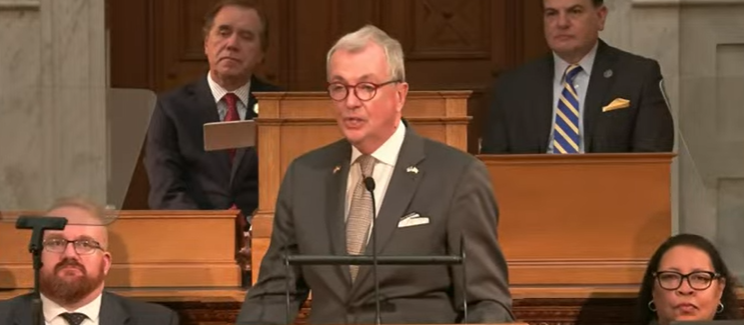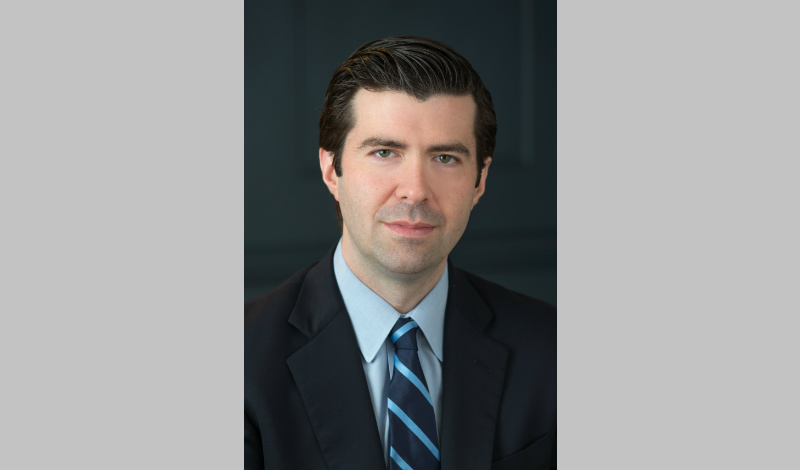
Governor Phil Murphy today signed A3540/S2544, establishing civil and criminal penalties for the production and dissemination of deceptive audio or visual media, commonly known as “deepfakes.” The Governor was joined by Lieutenant Governor Tahesha Way, Attorney General Matt Platkin, and Westfield High School junior and advocate Francesca Mani.
“I am proud to sign today’s legislation and take a stand against deceptive and dangerous deepfakes,” said Governor Murphy. “While artificial intelligence has proven to be a powerful tool, it must be used responsibly. My Administration is laser-focused on combatting misinformation and ensuring media integrity. We stand with the victims of deepfake imagery and will continue to prioritize the safety and well-being of all New Jerseyans.”
“While AI technologies present significant opportunity, as a parent, I share the Governor’s concern for the ways bad actors can use AI to endanger and harm our children. And as Secretary of State I also share concerns for interference with our elections,” said Lt. Governor Tahesha Way, who serves as Chief Elections Official in her capacity of Secretary of State. “Deepfakes are a powerful tool for deception, capable of undermining public trust. And, election interference is not just an attack on a process—it is an attack on the very foundation of our democracy. This legislation sends a clear message: New Jersey is ready for AI – both for all the good it can do, as well as the dangers it presents. And further, we will not tolerate attempts to manipulate our democratic processes. By establishing civil and criminal penalties for the creation and distribution of deceptive media, we are equipping our state with the tools to hold bad actors accountable.”
“Artificial intelligence can be used maliciously or irresponsibly to damage lives and reputations by producing or disseminating deceptive audio or visual media, commonly known as ‘deepfakes,’” said Attorney General Matthew J. Platkin. “This new law is aimed at those who would misuse this powerful technology to defraud or hurt others, and provides carefully tailored criminal and civil safeguards and remedies to protect the public when deepfakes are used improperly. We are grateful to the Legislature and Governor Murphy for enacting these new protections.”
Deepfakes are unauthorized photos and videos that have been nefariously manipulated into misleading imagery, including pornographic content. Bad actors have abused artificial intelligence tools to manufacture another person’s appearance and distribute fake, illicit material. Victims depicted in deepfake content are often left to navigate these violations of their privacy and trust, experience backlash from peers and loved ones, and combat falsehoods without the ability to criminally prosecute the offender and pursue justice.
Today’s legislation was inspired partly by the advocacy of Francesca Mani, a student at Westfield High School who has called for change after being targeted and victimized by peers that created and shared AI-generated, explicit images. Governor Murphy spoke with Francesca and her mother in September 2024 to express his admiration and support as they continued their journey to justice.
“I’m proud to have advocated for AI legislation since 2023 and honored to join Governor Phil Murphy as he signs this into law,” said AI deepfake victim turned advocate Francesca Mani, TIME100 Most Influential Person in AI. “This victory belongs to every woman and teenager told nothing could be done, that it was impossible, and to just move on. It’s proof that with the right support, we can create change together.”
Under the provisions of this law, individuals making or distributing deceptive audio or visual media for the furtherance of additional criminal activity are committing a crime of the third degree and may be subject to imprisonment and a fine of up to $30,000.
“The rapid proliferation of AI-generated deepfakes highlights the need for strong legislation to protect victims and prevent misuse,” said Congressman Tom Kean, Jr. “I commend Governor Murphy and the New Jersey Legislature for taking decisive action to establish criminal penalties for those who create or distribute harmful deepfakes. In Congress, I remain committed to advancing federal protections for children, women, and all victims of this emerging technology.”
The primary sponsors of A3540/S2544 are Congressman and former Assemblyman Herb Conaway, Majority Leader Louis Greenwald, Assemblywoman Ellen Park, and Senators Paul Moriarty and Kristin Corrado.
“When used maliciously, deepfake technology can dismantle lives, distort reality, and exploit the most vulnerable among us,” said Congressman Conaway. “I’m proud to have sponsored this legislation when I was still in the Assembly, as it will help us keep pace with advancing technology. This is about drawing a clear line between innovation and harm. It’s time we take a firm stand to protect individuals from digital deception, ensuring that AI serves to empower our communities.”
“Deepfakes have the potential to cause irreparable harm when used for criminal purposes” said Majority Leader Lou Greenwald. “This legislation takes a proactive approach to technological advancements and will safeguard New Jersey residents. By establishing additional penalties for the use of this technology to commit crimes, we can deter the use of deepfakes and provide judicial remedies for victims.”
“Deepfakes have evolved beyond just altered images – they now encompass all forms of audio and visual media and unfortunately, they are increasingly being used to threaten and invade individuals’ lives and personhoods,” said Assemblywoman Ellen Park. “This legislation is essential in our efforts to stay ahead of the malicious use of deepfake technology, ensuring that this deceptive content doesn’t cause issues that are beyond our control.”
“With Governor Murphy’s signing of this bill into law, we are sending a strong message that we will not tolerate counterfeit technology designed to deceive and mislead people,” said Senator Paul Moriarty. “Our democracy depends on trust, and this law helps us build that trust by keeping those who might disrupt it on their toes. The people of New Jersey must be protected from lies and manipulation, and this law is crucial to that protection.”
“The public sharing of unlawfully generated ‘deepfakes’ can be just as devastating for a victim as having a real form of media disseminated without their consent. This is especially true in cases where artificial intelligence has been used to create pornography,” said Senator Kristin Corrado. “We have an ethical responsibility to uphold transparency in the digital age. With the Governor’s signature, we’re taking a crucial step forward to protect individuals from the damaging effects of deceptive AI generated media by holding bad actors accountable.”
“Whether the targets are school children or adults, deepfakes can lead to deep problems on par with being a victim of fraud or identify theft,” said AFT New Jersey President Jennifer S. Higgins. “With this legislation, New Jerseyans will know that bad actors who produce deepfake audio or visuals will face serious consequences.”
“The New Jersey Coalition Against Sexual Assault (NJCASA) strongly supports New Jersey Bill S2544 as a critical step in addressing a rapidly growing and dangerous form of image-based sexual violence that not only invades privacy, but also inflicts profound psychological harm and amplifies a culture of sexual violence,” said Co-Director of NJCASA Denise Rodriguez, PhD. “We are grateful to Governor Murphy, the sponsors of the bill, and all those who supported it in taking steps toward a safer and more just New Jersey where the harmful consequences of image-based sexual violence are addressed with the urgency and seriousness they deserve.”
“The public at large gets their news online, and they believe what they see, especially if it is in a visual or audio format,” said New Jersey Institute of Technology Professor Vincent Oria, PhD, Chair of the Department of Computer Science. “I am happy that New Jersey is the first state to criminalize the production and dissemination of deceptive media.”
New Legislation Signed by Murphy Imposes Civil and Criminal Penalties for Deceptive AI Deepfakes
Governor Phil Murphy recently signed into law a groundbreaking piece of legislation aimed at combating the spread of deceptive AI deepfakes. The new law imposes both civil and criminal penalties for those who create or distribute deepfake videos with the intent to deceive or harm others.
Deepfake technology has become increasingly sophisticated in recent years, allowing individuals to create highly realistic videos that manipulate the appearance and actions of people in ways that are difficult to detect. While deepfakes have been used for harmless entertainment purposes, they also pose a serious threat to individuals’ privacy, reputation, and even national security.
Under the new legislation, individuals who create or distribute deepfake videos with the intent to deceive or harm others can face civil penalties, including fines and damages. In addition, those who use deepfakes to commit crimes such as fraud, harassment, or defamation can be subject to criminal prosecution, with potential jail time and other severe consequences.
The law also includes provisions to hold online platforms accountable for hosting deceptive deepfake content. Platforms that fail to remove deepfake videos that have been flagged as deceptive or harmful could face fines and other penalties.
Governor Murphy emphasized the importance of protecting individuals from the harmful effects of deepfake technology, stating that “the spread of deceptive AI deepfakes poses a serious threat to our society and must be addressed with strong legal measures.” He urged other states to follow New Jersey’s lead in enacting legislation to combat the spread of deepfakes and protect individuals’ rights.
The new law has been praised by privacy advocates and experts in AI technology, who see it as a crucial step towards regulating the use of deepfake technology and preventing its misuse. However, some critics have raised concerns about potential limitations on free speech and artistic expression, arguing that the law could stifle creativity and innovation in the field of digital media.
Overall, the new legislation signed by Governor Murphy represents a significant milestone in the ongoing efforts to address the challenges posed by deceptive AI deepfakes. By imposing civil and criminal penalties for those who create or distribute harmful deepfake content, the law aims to deter malicious actors and protect individuals from the potentially devastating consequences of deceptive AI manipulation.


